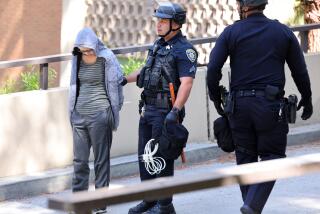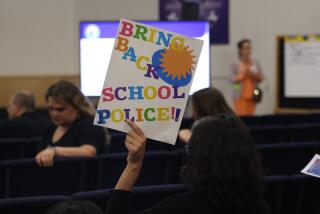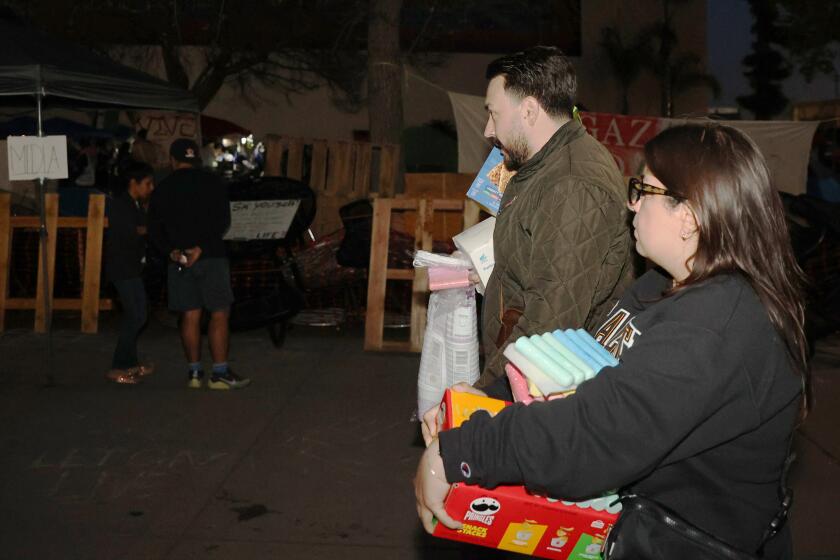Colleges Use Volunteer Teachers to Save Classes : Education: Strapped CSU campuses also shift courses to extension programs. Faculty union files grievances.
Three California State University campuses are taking what officials call unprecedented measures to avoid canceling classes by using volunteer teachers or transferring some required courses to off-campus extension programs.
About 50 volunteers--including graduate students and business people with no prior experience--are teaching Cal State Long Beach courses previously taught by faculty members whose contracts have been terminated.
San Diego State has shifted 22 courses to its extension program, where they cost students more and in some cases are taught by non-faculty personnel who receive less pay. The classes include English, sociology, teacher education, nursing and biology. San Francisco State has done the same with 31 courses, including English composition, history of Western civilization and philosophy.
Such practices have outraged the statewide faculty union, which sees them as a slap in the face to teachers who have been laid off, cheapening the educational experience for students, and sending a dangerous message to Sacramento that the system can continue functioning with inadequate funding.
“It’s disastrous,” said Pat Nichelson, president of the California Faculty Assn., which represents the system’s 22,000 instructors. To protest the practices, he said, the union has filed grievances at San Diego State and San Francisco State and is in the process of doing the same at Cal State Long Beach. “It takes jobs away from faculty members,” he said, “and sends the worst possible message. We think it opens the floodgates.”
The moves were made after budget cuts this year that put the CSU system $170 million in the red, resulting in the termination of 3,000 faculty members and cancellation of 4,000 classes.
University officials defend the practices as the only way to offer all the classes sought by students. Transferring classes to university extension programs, officials at the San Francisco and San Diego campuses say, is better than dropping them. At Cal State Long Beach, where a $15-million cut resulted in the termination of more than 500 full- and part-time lecturers and the cancellation of hundreds of classes, educators say that relying on volunteers is preferable to turning students away.
Rick Moore, a spokesman for San Diego State, said the decision to offer 22 classes for credit through the university’s extension program was made at the urging of faculty members. They were interested in serving students and providing a way for fellow teachers to keep working for pay even after being laid off, Moore said.
Because teachers in the extension program are paid directly out of fees collected from students in their classes rather than from state funds, he said, the impact on the university’s budget is minimal.
“(Most of the classes) are being taught by people we would have paid directly had the state provided the funding,” Moore said. “There was an attempt to take teachers that we couldn’t pay through the regular way so that they could continue to teach.”
Union officials, however, object to the practice because it puts former faculty members outside bargaining units and, in many cases, pays them less for doing the same job. “It’s a bad mistake,” Nichelson said. “It’s objectionable on many grounds.”
According to Cal State Long Beach President Curtis L. McCray, the new strategies may mark the beginning of a permanent change in the way universities do business. “We’re in a true crisis in that what comes after will never look like what came before,” McCray said. “I suspect we’re watching the transformation of public education in California.”
Although union and university officials say they believe volunteer teachers are being used on other campuses besides Long Beach, neither could say exactly where or how many. “We have more of them in urban areas because there’s a bigger pool of qualified people to teach,” said Colleen Bentley-Adler, a spokeswoman for the Cal State chancellor’s office. The system has used volunteers before, she said, but never in such numbers or for the reasons they are being used now.
Officials at the University of California and the Community College System say that they know of no such practices taking place on their campuses. “It would be a collective bargaining matter,” said Ann Reed, vice chancellor for public affairs for the 107-campus Community College System. “We would not be able to replace anyone with an individual who did not meet our standards as a faculty member.”
Because the CSU instructors would have been laid off anyway, Bentley-Adler said, the use of volunteers has deprived no one of a job.
Yet the union questions the value of an education provided by unpaid volunteers who, in many cases, have little or no teaching experience. “It goes right around the usual evaluation and review process for hiring and training faculty,” Nichelson said. “It’s misleading to students. They have a right to assume that all the usual professional standards have been maintained when classes are being taught; when they’re not, it should be clearly advertised that way.”
University officials maintain that all of the volunteers have either advanced degrees or professional experience that amply qualify them to teach a particular subject. On the Long Beach campus, according to Charles Austin, acting vice president for academic affairs and personnel, the volunteers were recruited by department heads looking to maintain specific courses.
Among the classes saved, he said, are required courses in engineering, math, industrial technology, computer science, theater arts, nursing, health sciences and criminal justice. Without the volunteers, Austin said, many students would have to delay their graduations until courses become available, or transfer to other campuses. The students receive credit for the courses as they normally would.
Although some of the unpaid instructors are experienced teachers who simply volunteered to stay on for the love of it, others are graduate students, alumni or those with expertise in a particular field.
“I find teaching very satisfying,” said James Marshall, 32, a security consultant who began teaching part time at Cal State Long Beach last year and lectures in electronics technology for free.
Milt Galbraith, 51, a police officer with the city of Orange who is teaching a course on law enforcement, said he sees the job as an opportunity to give something back to the university from which he graduated. “I have a fond remembrance of everything,” Galbraith said. “I just enjoy being before people to try giving them something that they can take away and use later.”
Bethany Dane, 27, a graduate student teaching a course in theater management, which is her major, said she volunteered for the experience. “I’ve always been very interested in teaching,” Dane said.
Because of the abundant availability of volunteers, Edward Purcell, a labor relations consultant for the CSU faculty union, said he fears the practice will spread.
“This is the tip of the iceberg,” he said. “I would be surprised if there aren’t a lot more grievances; it’s like a wildflower--once it gets started it will sweep through the campuses.”
McCray said the volunteers’ impact has been minimal so far and does not set a dangerous precedent. “We’re still down hundreds of classes,” he said. “I don’t hear any students saying that they’re able to get all the courses they want. If I were the union president I’d be saying the same things he’s saying, but I’m not and as a citizen I have to say that if there’s a chance to get classes taught, we ought to get them taught.”
Some of those enrolled in classes taught by volunteers agree. That was evident during a recent meeting of Dane’s course on theater management, which is required for all theater arts majors. Although her inexperience showed at the beginning of the semester, some students said, the quality of her lectures has grown steadily with her confidence.
“She makes it fun,” said Bill Robertson, 28, a theater arts major, adding that without Dane, he and other theater majors would be forced to delay their graduations until the course was offered.
One student said Dane’s inexperience may even add to her effectiveness. “She’s really gung-ho about teaching,” said Kari Trydahl, 21. “She’s excited and so she gets us excited. I don’t think we’d have gotten anything more out of a paid teacher. Bethany’s a little better; she’s not doing it for money but because she wants to.”
More to Read
Start your day right
Sign up for Essential California for news, features and recommendations from the L.A. Times and beyond in your inbox six days a week.
You may occasionally receive promotional content from the Los Angeles Times.






